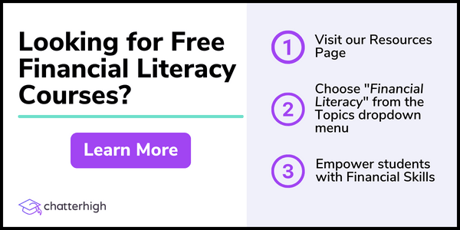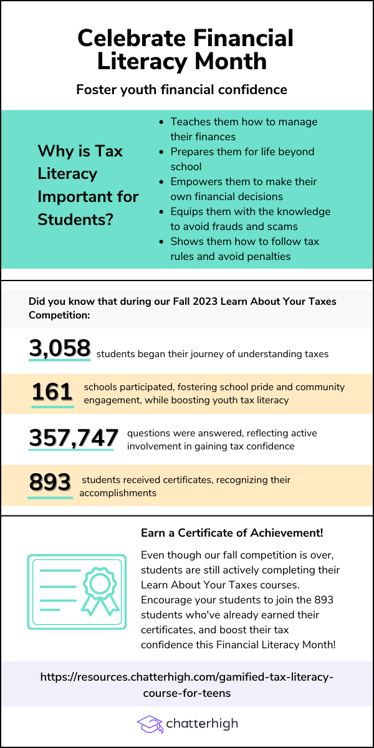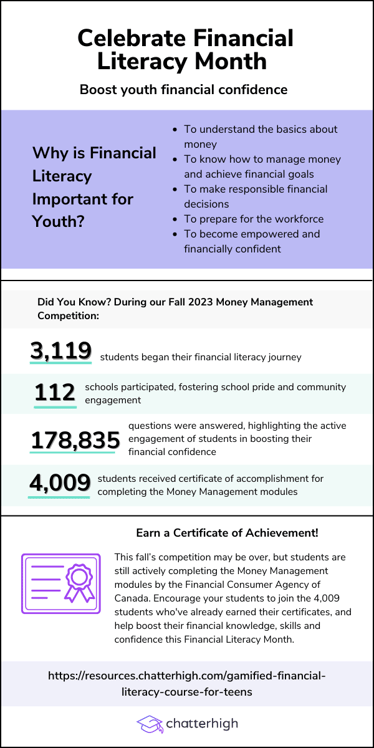Free Financial Literacy Resources to Empower Students
by Tanvir Kaur on 10 Nov, 2023
Many of us still remember the overwhelming experience of getting our first bank account and card for our initial job. Learning about taxes can feel like a daunting responsibility, and the fear of making mistakes in managing money adds to the stress. Many of us wish we had learned about money management and tax literacy before stepping into the complexities of adulthood. This sentiment sets the tone for the importance of financial education in the lives of students.
Understanding money and prioritizing financial literacy may seem advanced for middle and high school students, but it’s quite the opposite. The more students who comprehend how to manage money, save, and budget, the better prepared they will be for their financial journeys. Let's dive into the significance of financial literacy before exploring activities that educators can incorporate into their classrooms to empower students with financial well-being for a stress-free transition from high school to life beyond.
Importance of Financial Literacy for Students
With nearly three-quarters of Canadians having some type of outstanding debt or having used a payday loan in the past year, financial confidence is crucial. The National Report Card on Youth Financial Literacy survey of over 3,000 recent Canadian high school graduates revealed that more than half carry debt, including student loans, family loans, credit card balances, and lines of credit. As inflation rises and economic changes occur, students need financial confidence to step into the real world.
Why financial literacy is important for students?
- Financial Empowerment: Financial literacy empowers students to comprehend the intricacies of the global economy, from fluctuating interest rates to the dynamics of stock markets.
- Fosters Direction: Armed with a clear financial plan, students can set achievable goals, turning their aspirations into tangible realities. This, in turn, fosters a sense of purpose and direction as they envision and plan their financial futures.
- Boosts Confidence: Financial literacy builds confidence through research, understanding, and experience, fostering informed financial decision-making.
- Safeguards: Proactively engages students in the world of finances, preventing debt and scams.
- Builds Resilience: Financial literacy prepares students to face uncertain challenges, arming them with the knowledge to mitigate financial losses and navigate through uncertain times.
- Financial Independence: Financial literacy transforms students into self-sufficient individuals who understand the flow of money in and out of their accounts.
Boosting Financial Confidence Through Gamified Learning
Girls often face societal stereotypes that hinder their financial confidence, which builds a gap in financial literacy between genders. The Empowering Futures: Boosting Girls’ Financial Confidence Through Gamified Learning brief from the Financial Consumer Agency of Canada (FCAC) demonstrates the impact of gamified financial education in closing this gap.
From February 2022 to January 2023, FCAC partnered with ChatterHigh to deliver engaging, gamified financial education to over 7,400 students in grades 6-12 across Canada.
Key Findings:
- Significant improvements in financial knowledge and confidence for both girls and boys.
- Girls showed notable increases in areas like credit card knowledge, awareness of future expenses, and accessing financial information.
- Girls' confidence in managing money and preparedness for financial decisions also improved substantially.
Impact on Gender Equality:
- The interventions narrowed or closed the gender gap in critical financial literacy areas.
- Gamified learning boosted both girls' and boys' financial resilience, ensuring they are better prepared for real-world financial challenges.
Bring ChatterHigh’s gamified courses: Money Management Foundations and Managing My Money After High School, to your classroom and help students build the financial resilience they need for a successful tomorrow.
Free Online Financial Literacy Games and Resources
Now that we recognize the importance of financial literacy, let's explore some practical activities educators can incorporate into their classrooms to nurture these crucial financial skills:
Financial Literacy Games
- Financial Football (Visa): Engage students with sports-themed, interactive games that cover topics like identity theft, financial institutions, budgeting, and saving. These games cater to different difficulty levels and game lengths.
- Misadventures in Money Management: An interactive graphic novel experience designed to train students on navigating financial challenges.
- Money Magic: A video game teaching basic budgeting principles, challenging students to balance immediate wants with long-term plans.
- The Uber Game: A simulation game where students manage expenses as a full-time Uber driver, providing insights into the gig economy and budgeting conversations.
Financial Literacy Resources
- Your Financial Toolkit (Government of Canada): The Financial Consumer Agency of Canada offers 12 free, interactive modules covering essential financial topics, equipping students with the tools they need for financial fluency.
- OppU Courses: Develop a mindset crucial to impacting financial well-being through virtual video lessons on spending, budgeting, credit, and debt.
- McGill Personal Finance Essentials: A free online course from McGill University covering budgeting, borrowing, real estate, and more, providing students with the knowledge and confidence to make smart financial decisions.
- Financial Literacy Courses (Gamified Approach): Explore ChatterHigh’s gamified financial literacy courses that make learning financial foundations fun and interactive.
|
Throughout the Learn About Your Taxes courses by the Canada Revenue Agency (CRA), and
|
Conclusion
In conclusion, financial literacy is a critical skill that empowers students to make informed and confident financial decisions. By incorporating these activities into the classroom, educators can play a pivotal role in preparing students for a financially sound and stress-free transition from high school to life beyond. While there's no magic age to learn financial literacy, early exposure ensures students enter adulthood with the essential skills to navigate the complex world of finances.




